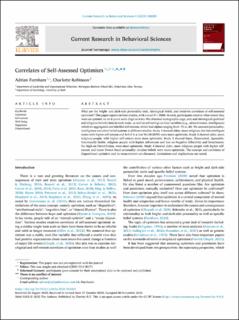Correlates of Self-Assessed Optimism
Peer reviewed, Journal article
Published version
Permanent lenke
https://hdl.handle.net/11250/3095941Utgivelsesdato
2023Metadata
Vis full innførselSamlinger
Originalversjon
Current Research in Behavioral Sciences (CRBS). 2023, 4 . 10.1016/j.crbeha.2022.100089Sammendrag
What are the bright- and dark-side personality trait, ideological belief, and mind-set correlates of self-assessed optimism? This paper reports on four studies, with a total N > 2000. In each, participants rated to what extent they were an optimist on an 8-point scale (high to low). We obtained demographic (age, sex) and ideological (political and religious beliefs) data in each study, as well as self-ratings on four variables (e.g., attractiveness, intelligence) which we aggregated and labelled self-esteem, which had alphas ranging from .70 to .80. We assessed personality, intelligence and other belief systems in different studies. Study 1 showed older, more religious, but less intelligent males with higher self-esteem and Belief in a Just World (BJW) were more optimistic. Study 2 showed older, more religious people, with higher self-esteem were more optimistic. Study 3 showed Open, Extraverted, Agreeable, Emotionally Stable, religious people with higher self-esteem and low on Negative Affectivity and Detachment, but high on Disinhibition, were most optimistic. Study 4 showed older, more religious people with higher self-esteem and lower Dweck fixed personality mindset beliefs were more optimistic. The concept and correlates of dispositional optimism and its measurement are discussed. Limitations and implications are noted.

